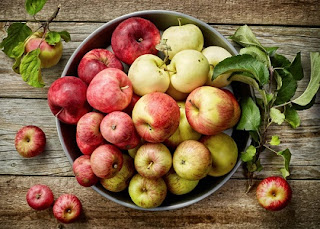Enjoy some apples
Fall is the season for apples. And apples are nutritious and an easy way to add some fruit to your day. Health professionals, even some nutritionists, used to put down apples as they thought apples provided little nutritional value. But with more research, they now know that apples contribute a lot of nutrition.
Nutritional value of apples
Calories – apples are low in calories and have no fat and no added sugar. Some people say apples have “too much sugar’. Not true. Health professionals want us to cut down on added sugars, not the sugars naturally present in fruit like apples.
1 apple provides about 95 calories
Fiber – so many Americans have diets low in fiber. Eating more fruits and veggies, especially raw fruit like apples, can add some fiber to your day. The white part of the apple provides soluble fiber. Soluble fiber helps lower your cholesterol, especially the “bad” cholesterol called LDL cholesterol. This is why foods with fiber are heart healthy. Soluble fiber also helps lower glucose levels. Eating the apple peel is also heathy as this provides insoluble fiber as many people refer to as “roughage” that helps your gut health.
1 apple provides over 4 grams of fiber
Antioxidants - Polyphenols – have you ever heard of “polyphenols” and what do they have to do with good health? When training to become a dietitian we never learned about “polyphenols”, only vitamins and minerals. Apples don’t just have one “polyphenol” but 5 different ones. NIH notes that apples are associated with reduced risk of heart disease, some cancers, diabetes and even asthma. It seems storage of apples doesn’t lower the antioxidant level. However, when they make apple juice, they significantly reduce the amount of polyphenols. So, focus on fresh fruit and not so much on apple juice.
Vitamin C – most people look to citrus fruits for their daily intake of vitamin C. And that is a good choice. However, apples do provide some vitamin C and many people may not be aware of this.
1 apple provides over 8 mg of vitamin C
Other nutrients: apples provide a lot of other vitamins and minerals. Many Americans have diets low in potassium, and one apple provides 195 mg of potassium while being very low in sodium – almost negligible. Interesting, that for plant growth and flower formation, apples require the mineral, boron. Apples are a good source of boron, a mineral important for bone health, energy and immunity. Apple juice has a little less boron than a fresh apple, but still provides a good amount of boron.
This fall, go out to an orchard and pick some apples. Go to an apple fest or farmer’s market and buy some fresh apples. And take the advice of NIH: The potential health benefits of apples are numerous. Regular consumption of fruits and vegetables, including apples, as part of a healthy diet may aid in the prevention of chronic disease and maintenance of good health.
Sources: calories, Soluble fiber , polyphenol , NIH , risk , boron , mineral , advice of NIH Image Sources: casserole , Apples , annotated
Sweet Potato and Apple Casserole (adapted from allrecipes and Environmental Nutrition)
- 3 sweet potatoes
- 2 large baking apples, cored, cut into ¼ inch rings
- 2 Tablespoons sugar (brown sugar)
- 1/2 c. Orange Juice
- 2 Tablespoons butter
- 3/4 Tablespoons cornstarch (or flour)
- 1/4 teaspoon salt
- 1/2 Tablespoon cinnamon (which = 1.5 teaspoons)
- 1/2 Tablespoon nutmeg
- 1/4 cup walnuts, chopped and toasted (or use pecans)
- Preheat oven to 350 degrees. Scrub potatoes well, pat dry, and pierce like
you would a baked potato.
- Place sweet potatoes on a cookie sheet and bake in the oven until tender, about 35-45 minutes. Cool to touch, then remove skins. Slice and layer sweet potatoes and peeled apple rings in a buttered dish (7 X 11-inch baking dish).
- Boil together, sugar, water, butter, cornstarch
and salt, until it begins to thicken.
- Pour over yams and apples, sprinkle with
cinnamon, nutmeg and nuts.
- Bake covered at 350 degrees for one hour.






Comments
Post a Comment